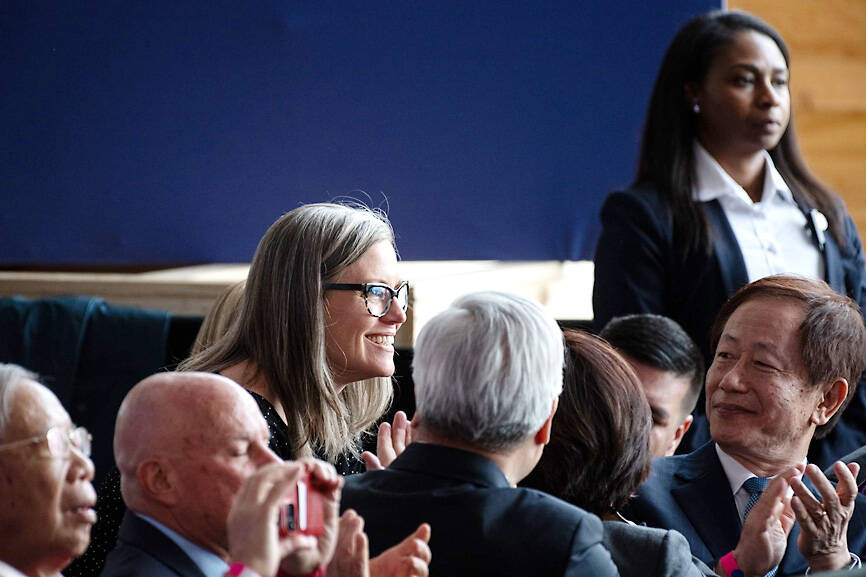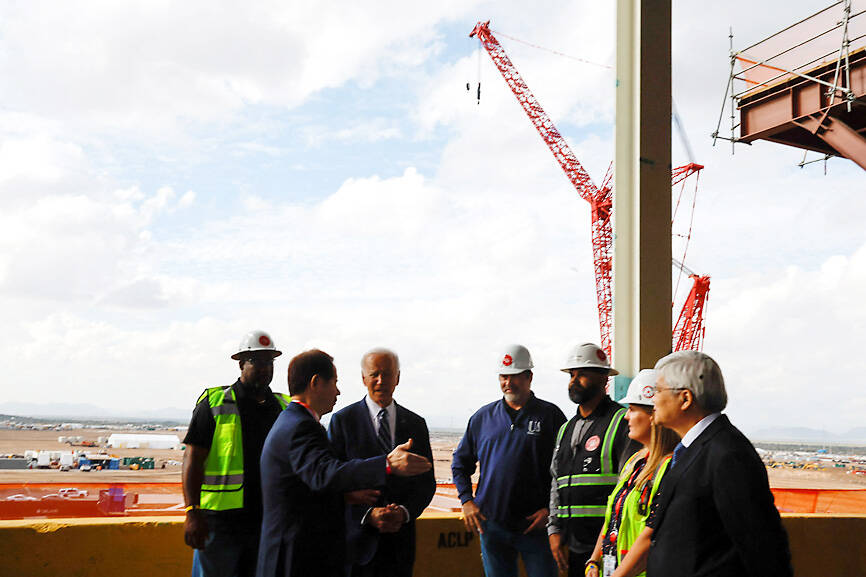Taiwan Semiconductor Manufacturing Co (TSMC) has agreed to more scrutiny when it comes to the safety of construction workers building its first US plant, Arizona Governor Katie Hobbs said on Friday.
At a news conference held against the backdrop of ongoing construction at a site in north Phoenix, Hobbs said that the TSMC facility and the state have signed a voluntary protection program.
“Under this agreement, TSMC will adhere to requirements higher than those at the federal level,” the governor said. “These additional safety measures include greater transparency for workers, closer oversight from the Arizona Division of Occupational Safety and Health and increased training for foremen and all hands.”

Photo: Bloomberg
Hobbs said that construction safety standards should match the quality of the highly publicized project that has been the source of much pride.
US President Joe Biden visited the site in December last year, praising it as a demonstration of how his policies are fostering job growth. Biden has staked his legacy in large part on major investments in technology and infrastructure that were approved by the US Congress along bipartisan lines.
The plant’s construction was first announced in 2020 during the administration of then-US president Donald Trump. At that time, TSMC said that it was investing US$40 billion over eight years in Arizona and would construct a second plant.

Photo: Reuters
Then-Arizona governor Doug Ducey said that the factory would create more than 1,600 new high-tech jobs in the state.
Construction started in 2021 on more than 445 hectares of land. The plant is slated to be in full production next year. The facility is to utilize TSMC’s 5-nanometer technology for semiconductor wafer fabrication and have the capacity to produce 20,000 wafers per month.
The company has received criticism for bringing in some workers from Taiwan to help with construction.
TSMC has said that the jobs of thousands of US workers already on site would not be affected.
Hobbs on Friday also announced the launch of a initiative to double the number of registered construction and trade apprentices in Arizona over the next three years.

Three Taiwanese airlines have prohibited passengers from packing Bluetooth earbuds and their charger cases in checked luggage. EVA Air and Uni Air said that Bluetooth earbuds and charger cases are categorized as portable electronic devices, which should be switched off if they are placed in checked luggage based on international aviation safety regulations. They must not be in standby or sleep mode. However, as charging would continue when earbuds are placed in the charger cases, which would contravene international aviation regulations, their cases must be carried as hand luggage, they said. Tigerair Taiwan said that earbud charger cases are equipped

Foreign travelers entering Taiwan on a short layover via Taiwan Taoyuan International Airport are receiving NT$600 gift vouchers from yesterday, the Tourism Administration said, adding that it hopes the incentive would boost tourism consumption at the airport. The program, which allows travelers holding non-Taiwan passports who enter the country during a layover of up to 24 hours to claim a voucher, aims to promote attractions at the airport, the agency said in a statement on Friday. To participate, travelers must sign up on the campaign Web site, the agency said. They can then present their passport and boarding pass for their connecting international

UNILATERAL MOVES: Officials have raised concerns that Beijing could try to exert economic control over Kinmen in a key development plan next year The Civil Aviation Administration (CAA) yesterday said that China has so far failed to provide any information about a new airport expected to open next year that is less than 10km from a Taiwanese airport, raising flight safety concerns. Xiamen Xiangan International Airport is only about 3km at its closest point from the islands in Kinmen County — the scene of on-off fighting during the Cold War — and construction work can be seen and heard clearly from the Taiwan side. In a written statement sent to Reuters, the CAA said that airports close to each other need detailed advanced

The age requirement for commercial pilots and airline transport pilots is to be lowered by two years, to 18 and 21 years respectively, to expand the pool of pilots in accordance with international standards, the Ministry of Transportation and Communications announced today. The changes are part of amendments to articles 93, 119 and 121 of the Regulations Governing Licenses and Ratings for Airmen (航空人員檢定給證管理規則). The amendments take into account age requirements for aviation personnel certification in the Convention on International Civil Aviation and EU’s aviation safety regulations, as well as the practical needs of managing aviation personnel licensing, the ministry said. The ministry